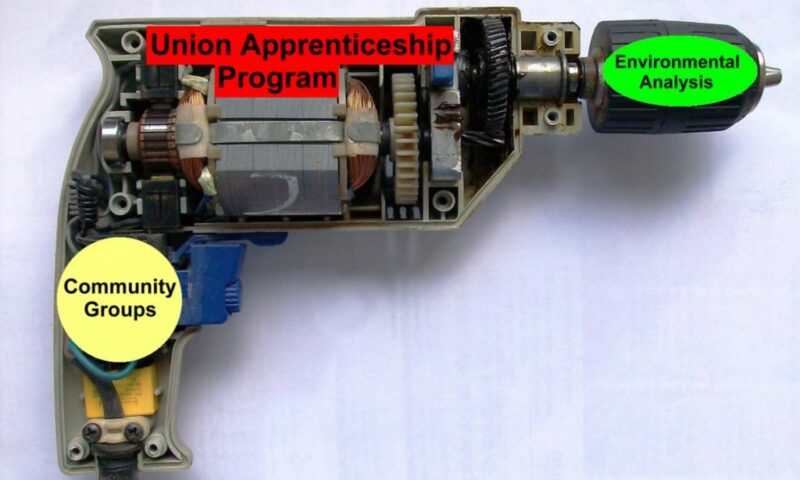
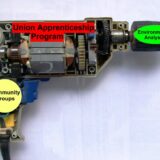
One central challenge to building a green economy is that for many, the inner workings of a key pillar of that economy — the construction industry — are a mystery. Understanding construction helps us move beyond simply creating green “jobs,” which could be temporary or even dangerous, to building a new green economic sector that generates permanent construction careers.
Construction is one of the largest sectors of the U.S. economy, with a dollar value approaching $800 billion and more than 7.2 million workers. It brings together people from all different walks of life. For community members that the economic downturn has hit the hardest — low-income workers, minorities, women, those returning from the military or from prison — construction offers a chance at a middle-class career.
A growing piece of the construction industry is retrofitting buildings to increase energy efficiency. Launching a project to retrofit a building,
» Read more about: What It Really Takes to Create a Green Economy »


At any point in their lives, workers may need to take time off to care for either a new child or a sick family member. While we have state and federal laws to protect workers from losing their jobs or benefits when they take leave, the leave time is mostly unpaid. Unpaid leave hurts a family’s income and economic security – many of our working families, especially in this economy, live at the margin and can’t afford to take leave without pay.
No worker should have to make the difficult choice between a paycheck and being there for a loved one.
Ten years ago, labor unions and community organizations in California came together to ensure that our working families did not have to make this difficult choice. We successfully advocated for and passed the California Paid Family Leave (PFL) Act in 2002.
The PFL law established the first-of-its-kind family leave insurance program in the nation.
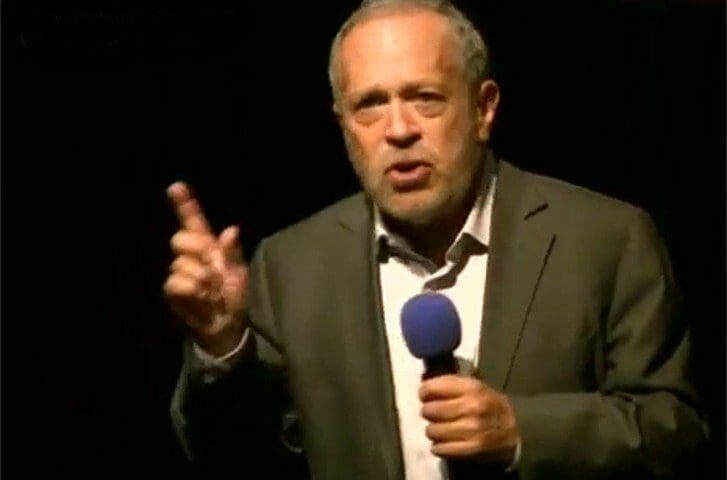

Economist Robert Reich lays it all out for us as he debunks six conservative economic myths.This clip was taken from a talk at the Summit For a Fair Economy in Minneapolis.
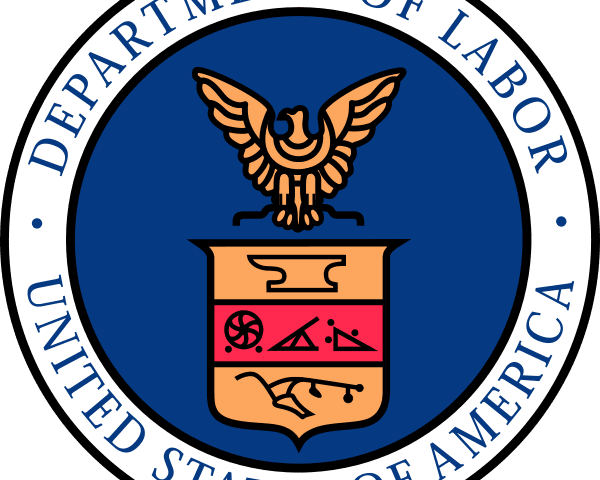
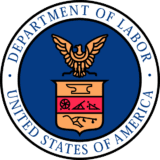
I just received my my latest 401k quarterly statement and the following was printed on the front. Is this what they mean by “job killing government regulations?” (If so, bring them on!)
“Beginning August 30, the Department of Labor requires fees to be consistently disclosed to all eligible employees, participants and beneficiaries of retirement plans subject to the Employee Retirement Income Security Act. As a result, statements have been enhanced to display more details about retirement plan fees. Now it may be easier for you to compare fees to overall value. There are no new fees as a result of the new regulations – just new ways of showing fees that already exist.”
Background: The Department of Labor’s Employee Benefits Security Administration (EBSA) released the final rule in February 2012 to give workers uniform, comparable and understandable information about costs and fees of their plan so they can better manage their retirement investments.
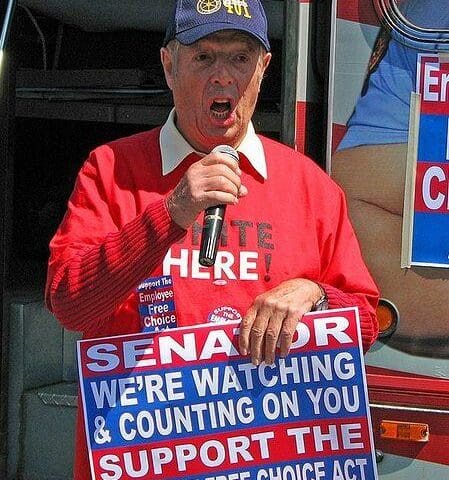
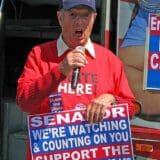
(The following feature originally appeared on Labor Notes and is reposted hereby permission.)
When the next opportunity for labor law reform arrives, union membership will be smaller and our political clout even more diminished. If we are to succeed, future reform proposals must be wrapped in a broader mantle that will appeal to all workers.
The four-year drive for the Employee Free Choice Act was the single largest union-backed campaign in decades and it succeeded in uniting the labor movement as never before. I doubt there was a steward in the country who wasn’t familiar with EFCA and why we needed it.
The proposed law, which so many members fought for between 2006 and 2010, would have made it faster and easier for workers to gain union recognition through card check, created stiffer penalties for employers who violate labor laws,


If you’ve been following media coverage of the battle over Walmart’s proposed store in Chinatown, you probably have the impression that the fight is between the retail giant and labor. Chinatown leaders have been largely absent from press reports of the controversy, and to the extent they are mentioned one would think they want Walmart in their neighborhood.
Thursday’s hearing at the L.A. City Planning Commission should set the record straight — Chinatown doesn’t want Walmart, and residents and business owners are loud and clear about it for anyone who is paying attention.
The hearing was on the proposed Interim Control Ordinance (ICO) for Chinatown, which would temporarily stop chain stores over 20,000 square feet from opening in that community. By a vote of 14 to 0 the Council directed the Planning Department to draft the ordinance back in March, but staff dragged its feet for more than three months.
» Read more about: Walmart’s Bureaucratic Victory Can’t Mask Growing Opposition »
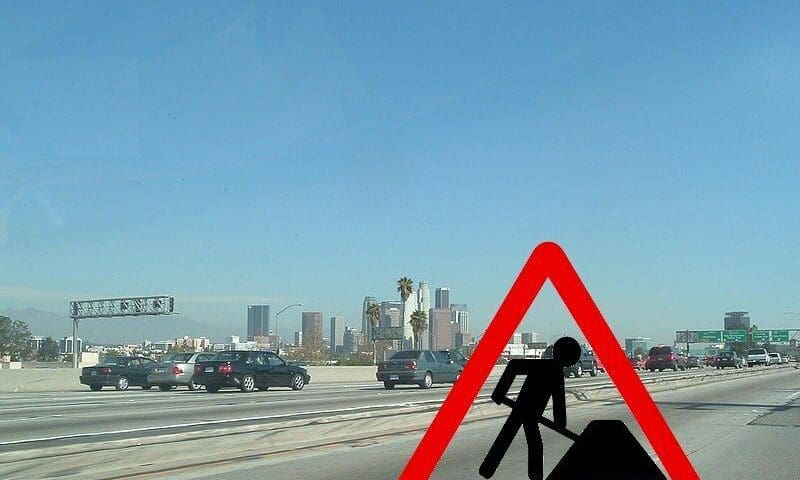

Mark Lacter, in a recent conversation on KPCC’s Business Update, was surprisingly cynical about the importance of publicly funded transit projects to our region’s economic recovery.
Commenting on the recently passed federal transportation bill that will expedite construction of 12 L.A. County mass transit projects, Lacter challenged Mayor Villaraigosa and other elected officials who tout the “game-changing” job creation benefits of public works investment. He argued that it is hard to determine the number of jobs generated by these types of projects.
It’s true that there is no way to predict the precise number of direct and indirect jobs created through infrastructure investment. But we cannot underestimate the ability of these projects to increase employment in the construction industry, one of the hardest-hit sectors during the Great Recession.
The 12 transit projects that will now be fast-tracked are part of a larger package of transportation improvements that will create at least $2.8 billion in economic activity and $65 million in additional tax revenue for L.A.
» Read more about: Earth to Mark Lacter – Investing in Infrastructure Is a Game Changer »
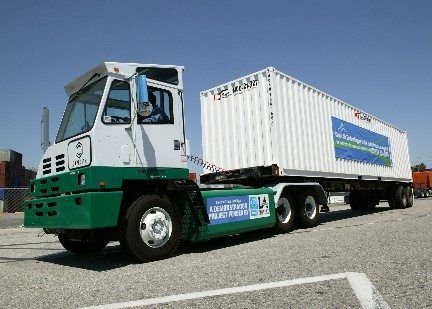

Imagine you just finished your standard 65-hour work week. You’re exhausted, you want to go home and spend time with your family – you never really get to see them but for your one day off – but you know instead you’re going to fall asleep within minutes of getting home. Your legs and back ache from today’s 12-hour shift, but at least it’s payday. You wince when you see your check: It’s going to be another month of some tough decisions about which bill to forgo, but at least the rent will get paid and you’ll be able to pick up some groceries.
Except that as he hands you your check, your boss tells you that he’s adding another five hours to your weekly schedule. You’re not going to get paid any more money, but you will have to work more hours.
This is essentially the situation that truck drivers at the Ports of Los Angeles and Long Beach are about to find themselves in as changes roil the industry.
» Read more about: Carriers Stick Port Truck Drivers With Chassis Fees »


The young lifeguard, Tomas Lopez, who was fired recently for saving a life, is now being honored by the South Florida city of Hallandale Beach as a hero. He’s been interviewed on CNN, Fox and Friends and is a YouTube celebrity. This week, he was given the key to the city.
Lopez was the employee of Jeff Ellis Management, LLC, the private company the city contracts with to provide lifeguard services on a stretch of public beach. He ran to rescue a swimmer and was fired because he left the beach zone the company was paid to protect. Six of Lopez’s co-workers said they would have done the same and were fired also. It has been a public relations disaster for the company and has put the small city of Hallandale Beach into the national spotlight.
But, in some respects, the firing was a logical, if unwise,
» Read more about: City Budgets, Outsourcing and a Fired Lifeguard »
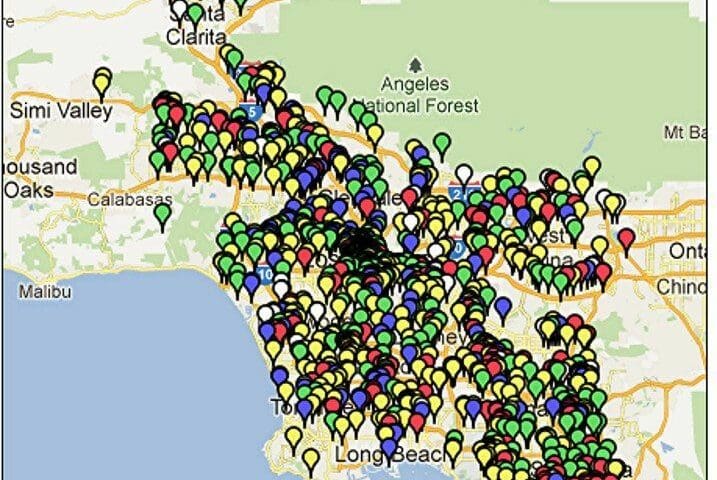
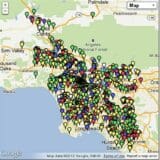
Here’s a Google map you may not want to be consulting any time soon – at least without a drink in hand. It’s the one used by Working America‘s Job Tracker feature that shows the locations of American jobs reported to be leaving your community. By punching in a ZIP Code, you’ll be able to see which companies are exporting jobs or laying off employees, as well as those which have been cited for health and safety violations.
Entering one L.A. ZIP brought up the scary-looking map above, along with links spelling out who’s involved and where this labor triage is taking place within a 50-mile radius of the ZIP Code.
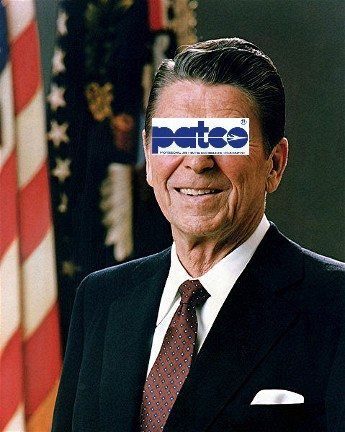
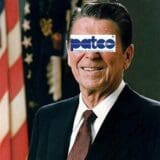
Much has been said in recent months about the labor movement’s “impending decline,” with the right wing’s unrelenting attacks against collective bargaining rights in states across the country, from Arizona to Wisconsin to New Jersey. California is facing its own version of this attack with the qualification of the Paycheck Deception initiative for the November 2012 ballot that would dramatically curtail working people’s ability to participate in politics in the state.
Many people in the modern progressive movement date the beginning of these assaults to Ronald Reagan’s 1981 decision to fire 12,000 air traffic controllers after their union, PATCO, went on strike and shut down the nation’s airports. President Reagan’s decision to permanently fire (and prohibit any rehire of) all the controllers destroyed PATCO and served as the starting-pistol shot for three decades of attacks on the right to collective bargaining, that continue today.
» Read more about: How PATCO Crashed – But Why Unions Don’t Have To »
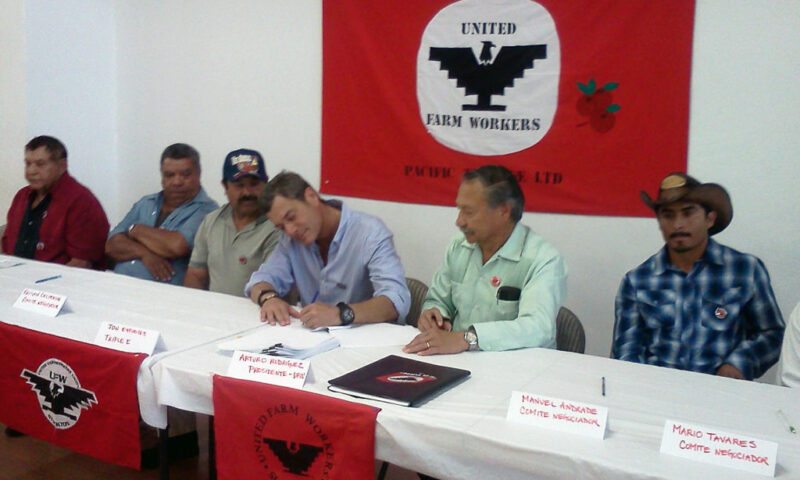

Last week in Stockton, the United Farm Workers signed a three-year contract with Pacific Triple E Ltd., a large tomato grower-shipper based in Tracy, California. According to The Record, the agreement represents the first time the UFW has enjoyed a membership presence in San Joaquin County in more than two decades.
The Packer, an industry newsletter, described Triple E as “a family owned company” operating in Fresno, Merced, Madera, San Joaquin and Sacramento counties. The union’s Web site announcing the pact included the following message from UFW president Arturo Rodriguez:
Thank you for being there for the United Farm Workers. Your support means so much to me and the workers we are here to serve. I want to share some wonderful breaking news with you.
Yesterday, we used a contract signing ceremony in Stockton to congratulate the 800 workers at Pacific Triple E Ltd.
» Read more about: UFW Wins New Tomato Contract in Central Valley »


(The following post appeared on the blog of the International Association of Machinists — IAM.)
If the Trans Pacific Partnership agreement (TPP) is signed into law at the end of this year, the rules for international trade and the global economy will change dramatically, and not for the better.
Despite the potential for the TPP to negatively impact hundreds of thousands of American jobs, the negotiations to create the massive trade pact are being conducted in unprecedented secrecy. Access to the pact’s draft language is limited almost exclusively to a handful of government negotiators and corporate advisers.
Among those denied access to the pending terms of the trade deal was Senator Ron Wyden (D-OR), chairman of the U.S. Senate Finance Subcommittee on International Trade, Customs and Global Competitiveness. Outraged, Wyden responded with a bill demanding greater transparency in the negotiations. Over 130 members of Congress also took action,
» Read more about: Trans Pacific Partnership: Exporting US Jobs »


On July 3 the Asian Pacific American Labor Alliance (APALA) and United Food and Commercial Workers Local 770 filed a lawsuit challenging the City of Los Angeles’ handling of Walmart’s controversial Chinatown store project.
The suit alleges that the L.A. City Department of Building and Safety failed to notify the public of its decision to issue a Notice of Exemption (NOE), which allows Walmart to move forward on its Chinatown project without environmental review. The lawsuit also asks a judge to stop construction at the store.
The plaintiffs in the lawsuit are asking a judge to find the exemption invalid and require that a new one be issued. Because the building permits are being appealed – an initial hearing is expected in August – the lawsuit argues that the exemption should not have been issued until the appeal process was exhausted.
The notice to the public of the exemption is intended to prevent the appearance of backroom deals.
» Read more about: Lawsuit Challenges City’s Actions on Walmart Chinatown Store »

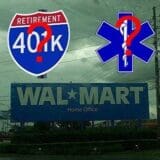
Nearly all employers struggle to contain health care costs. Walmart, however, has long made it part of its business model to externalize those costs. The World’s Biggest Company has repeatedly come under fire from labor and community groups, as well as states, for promoting a health care structure that encouraged employee reliance on Medicaid. The Supreme Court’s June 28 decision upheld the heart of the Affordable Care Act, which was good for President Obama–and also good for Walmart.
“The ‘Obamacare’ plan is a huge subsidy to Walmart,” Nelson Lichtenstein, author of The Retail Revolution: How Walmart Created a Brave New World of Business said in a phone interview. The Affordable Care Act will also benefit the bottom rung of Walmart’s workforce who will be eligible for Medicare under the plan, he added.
Lichtenstein refers to Walmart’s army of part-timers. The retailer’s Web site features a state-by-state report of its average hourly rate for full-time regular employees and makes much of the figures—but the pay scale numbers don’t apply to large numbers of Walmart associates (and are disputed by advocates who use industry research to place the pay scales at a lower rate.)
USA Today reports that Walmart declined to say what the retailer’s national hourly wage is for part-time workers.
» Read more about: Wal-Fare Benefits: Facts About Walmart Employee Plans »
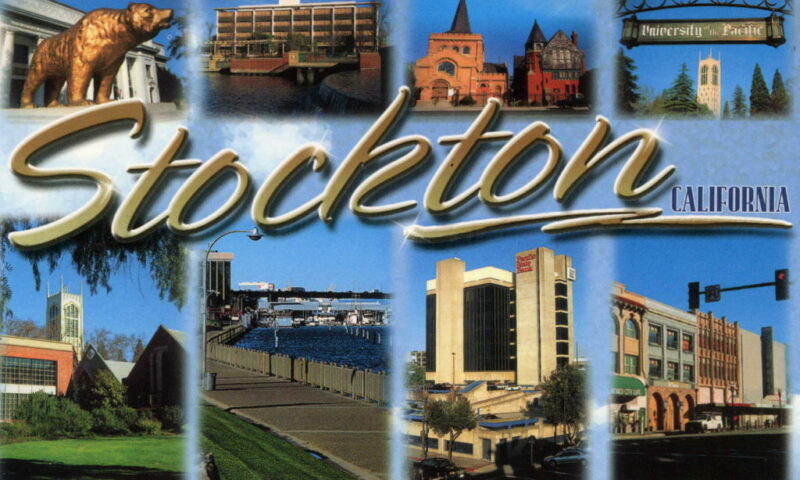
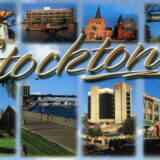
My hometown just declared bankruptcy. No, not the town I was born in, and not the place I have lived most of my adult life, but where I grew up. Stockton, with a population of about 300,000 is the largest city in America to file for Chapter 9 protection. Conventional wisdom says it was the unfunded pension liability or mismanagement or too much debt, and under state guidelines for bankrupt cities, somebody has to take the blame. But the choices that led to this debacle go back decades.
When I left Stockton in the mid-1960s for college, it was a divided city. The affluent and mostly white people lived on the north side. The “others” lived to the east and south. Others were people who worked with their hands, people who picked the fields, people who worked the seasonal canneries. These were mostly low-wage workers, sometimes no-wage workers who turned fresh produce into food for supermarket shelves across the country.
» Read more about: Stockton Bankruptcy: Fat City’s Missed Opportunities »
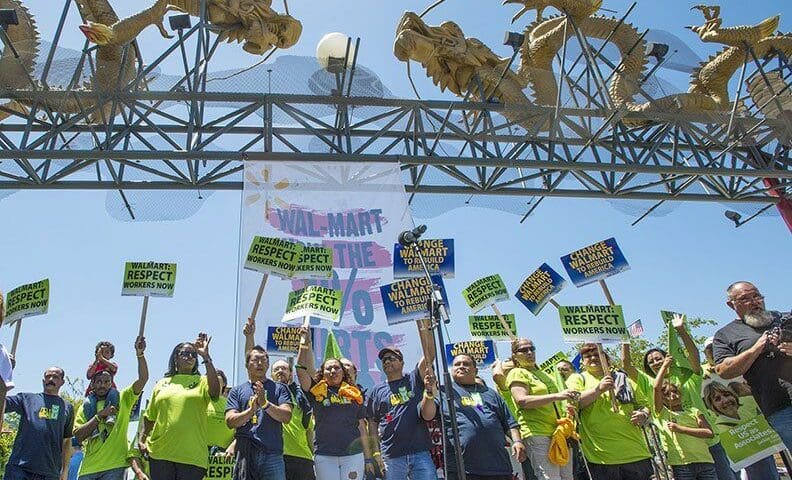
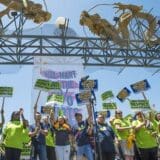
Last Saturday, thousands of people made history in Chinatown at the largest Walmart protest ever held. Spurred by Walmart’s attempt to build its first L.A. grocery store in Chinatown, the crowd, many wielding handmade protest signs, marched from Los Angeles State Historic Park (the Cornfield) through one of L.A.’s oldest neighborhoods.
They came to fight what Walmart’s presence in this community, and others across Los Angeles, would bring: low-wage jobs, the destruction of local businesses and the spirit-crushing replacement of local character with chain store sameness.
At the main rally, underneath the iconic dragon gates on Broadway and Cesar Chavez Avenue, participants listened to a lineup of speakers and entertainers, the latter including Grammy winners Tom Morello and Ben Harper. Among the most compelling were current Walmart workers scraping by on poverty wages and reliance on government assistance, and community leaders concerned about the destruction of their cultural heritage Walmart would cause.
» Read more about: Thousands March and Rally Against Walmart in LA »
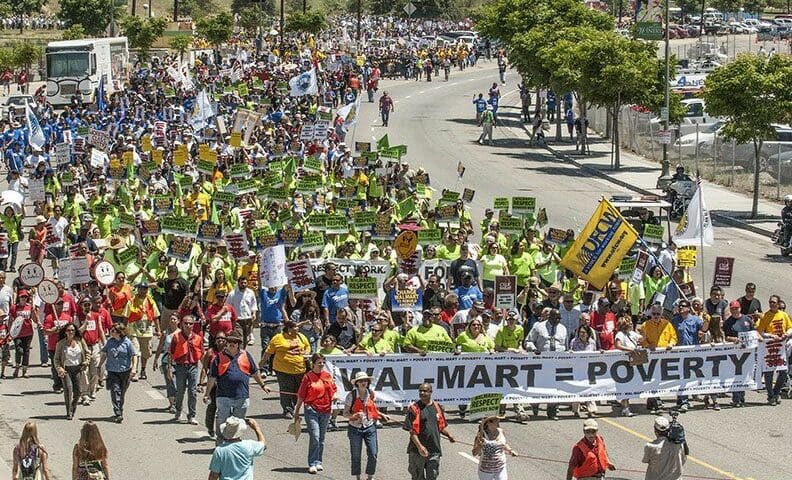
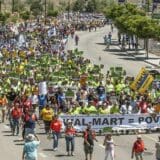
Under clear skies and searing heat, thousands turned out on June 30 to protest Walmart’s controversial plan to open its first L.A. grocery store in Chinatown. Among the featured speakers at the event was Grishriela Green — one of dozens of current Walmart employees who joined the march and rally, bringing with them a distinctly personal perspective on the retail giant.
Green, who was hired by Walmart’s store in the Crenshaw District three and a half years ago, was raised in a family that imbued her with an understanding of the importance of hard work, and of speaking one’s mind. When the Crenshaw Walmart first opened, Green was optimistic about the effect it would have on her life and community, but quickly became disillusioned with the corporation’s claims.
“One of the promises, which is a half-truth, is it’s a career opportunity for each and every associate,” said Green. “Even after 20 years,


As thousands prepare to hit the streets of L.A.’s historic Chinatown on Saturday, June 30, for the largest protest against Walmart ever held in the U.S., several acclaimed musicians, including three Grammy winners, are joining the growing effort to stop the world’s largest retailer from opening in Chinatown and expanding across Los Angeles with poverty-level jobs and practices that hurt local businesses and communities. Musicians are also backing hundreds of Walmart workers who will march on June 30 to demand Walmart treat them with respect and provide wages that can support families.
Grammy Award-winning singer-songwriter, actor and author Steve Earle made a video from a recording studio in Nashville to support the march against Walmart in Los Angeles on June 30. After singing a few lines from his new song, Earle says, “If I wasn’t [in Nashville making a record] I would love to be in Chinatown,
» Read more about: Musicians Stand Up to Walmart in Los Angeles »